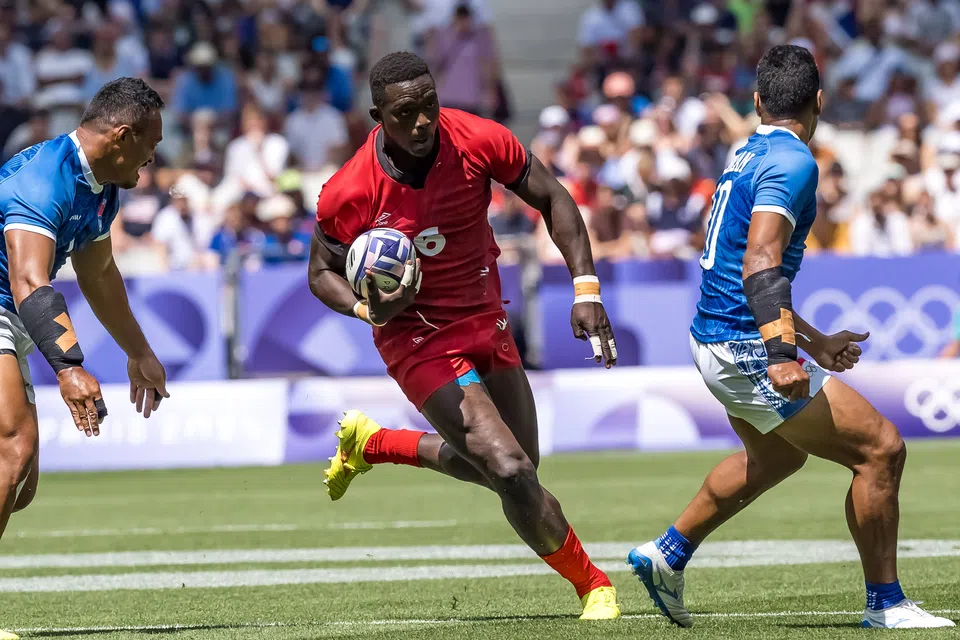Kevin Wekesa’s IOC Award Nomination is more than a line on a resume, it is a story about a rugby star using his platform to change everyday habits in sport and beyond. The Kenya Sevens and Kabras Sugar forward has been named among a select group for the 2025 International Olympic Committee Climate Action Awards, and with it, his movement for greener sport steps into the global spotlight.
Wekesa has grown into an increasingly influential voice within Kenya Sevens, the men’s national side known as Shujaa, and this recognition places his leadership in a broader context. It ties performance and purpose together, showing how a player’s impact can stretch from the try line to the training ground and into communities across the country.
The International Olympic Committee created the Climate Action Awards to celebrate individuals and organizations within the Olympic Movement who are taking concrete steps to address climate change through sport. Wekesa’s inclusion among the final group underscores how rugby, a game defined by grit and teamwork, can model practical solutions that others can adopt.
What Play Green is doing on and off the field
At the heart of the nomination is Wekesa’s Play Green initiative, a simple and effective approach that replaces wasteful habits with sustainable routines. The project is designed to foster environmentally conscious practices within the sporting community, showing teams how small changes can yield big results over time.
One of the most visible changes has been the introduction of reusable aluminium water bottles for both the men’s and women’s national rugby teams. By shifting away from plastic, the initiative eliminates an estimated 144 single-use plastic bottles during each training session, a practical move that players and staff can feel the moment they step off the field.
These numbers compound quickly during a busy training week, with the reusable system saving nearly 1,000 bottles weekly. The message is clear, reduce waste where you can, and reinforce new habits until they feel natural. It is an everyday solution that shows sustainability can be measured in small wins that add up.
The influence of Play Green now reaches beyond national-team camps, extending to over 40 schools across Kenya. Through mentorship programs and sustainability workshops, the initiative is nurturing awareness among young athletes, coaches, and teachers who can carry these practices into schoolyards and neighborhoods.
The results are taking root in literal ways too. Schoolchildren involved in Play Green have planted more than 2,300 trees, a visible and tangible expression of climate action. In classrooms and on fields, the idea is the same, make sustainability a habit that becomes part of the culture of sport.
Why this nomination matters for Kenyan rugby
Wekesa’s path shows how a player can transform leadership on the pitch into stewardship off it. For Shujaa and the wider rugby scene, the nomination affirms the idea that sport can serve as a classroom for environmental responsibility, where teamwork and discipline align with long-term community benefit.
It also tells a compelling story about identity. Kenyan rugby is known for resilience and flair, and Wekesa’s work adds another layer, responsibility. The Play Green blueprint is accessible, portable, and relatable, traits that make it easier for clubs and schools to adopt, and for administrators to support.
The scale of recognition and the company he keeps
Wekesa is part of a select circle of 15 finalists for the 2025 IOC Climate Action Awards. The shortlist highlights athletes and advocates who are linking performance and purpose, and together they map out how different corners of the sporting world can move in the same direction on climate.
Among the other finalists are athletes whose projects mirror the same spirit of practical impact and community reach. Their efforts reflect a shared belief that sport can be a vehicle for measurable change.
- Rhydian Cowley, an Australian race walker who has advocated for climate action plans within athletics organizations,
- Hugo Inglis, a New Zealand hockey player and co-founder of High Impact Athletes, which has mobilized over 240 athletes to direct more than 2 million dollars toward climate and health projects,
- Oliver Scholfield, a Canadian athlete whose consultancy, Racing to Zero, assists sports federations in reducing their environmental footprint,
- Gabrielle Smith, a Canadian athlete whose Rising Tides project has removed over 335 kilograms of underwater waste and provided environmental education to children from disadvantaged communities.
| CASINO | BONUS | INFO | RATING | |
|---|---|---|---|---|
|
bonus
Join VIP Club for exclusive rewards!
See 4 Bonuses
|
info
High RTP of 97%, crypto-ready payments, top providers ALSI-202410011-FI1 |
|||
|
bonus
Sign up for KES 46 bonus after first deposit!
See 11 Bonuses
|
info
20+ crash & instant games, Aviator bonuses BK 0000704 |
|||
|
bonus
100% match bonus up to $500 for new users!
See 6 Bonuses
|
info
Lots of bonuses, 3,000+ games, instant-play & fast payouts No.1668 / JAZ |
|||
|
bonus
Welcome package: 190000 KES + 150 FS!
See 12 Bonuses
|
info
Experience the thrill of our casino! Spin, win, and enjoy top-notch games anytime ALSI-202411073-FI2 |
Milestones to watch next
The winners of the IOC Climate Action Awards will be announced ahead of Milano Cortina 2026, the Winter Olympic Games that will showcase not only elite performance but also the sustainability stories shaping the Olympic Movement. For Wekesa and Play Green, the lead-up offers a chance to deepen the work already underway and inspire more partners to step in.
That timeline matters because it encourages continued action now, not later. It invites teams, schools, and federations to benchmark their own habits, from hydration practices to travel planning, and to consider where straightforward changes can deliver outsized results.
Kenyan influence in Olympic spaces
Kenya’s presence in Olympic decision-making has grown in meaningful ways. Former Kenya 7s great Humphrey Kayange has been named chair of the International Olympic Coordination Commission for the Dakar 2026 Youth Olympic Games, a reminder that Kenyan rugby voices are helping shape the future of sport at multiple levels.
That context gives Wekesa’s nomination additional resonance. It places Play Green within a broader movement of Kenyan leadership, where athletes and administrators are pushing for excellence on the field and responsibility off it.
The Play Green blueprint and what it teaches
There is a quiet power in the way Play Green operates. By starting with reusable bottles, extending to workshops, and expanding into schools, the initiative shows how to build momentum through habits. In an era where climate challenges can feel overwhelming, small and repeatable steps are often the ones that stick.
For teams and educators, the lesson is straightforward. Pick a clear target, track the impact, and share the story so others can copy and adapt it. Wekesa’s approach makes sustainability less about slogans and more about results that can be counted at the end of a session or a school term.
What this means for fans and the next generation
Fans often ask how they can contribute beyond cheering. Initiatives like Play Green offer practical answers that fit into daily life, choices about water bottles, waste, and planting that families and schools can make together. The visibility of a national team player helps those choices feel connected to something bigger.
For young athletes, seeing a Kenya Sevens forward champion practical climate action links performance with purpose. It signals that leadership includes the environment you train in and the communities you represent. That message travels quickly through clubhouses, classrooms, and local tournaments where habits are formed.
A nomination that feels like a beginning
Whether or not Wekesa’s name is called when the IOC announces the winners, the momentum is already real. The shift away from single-use plastic, the reach into schools, and the trees planted by students offer measurable proof that sport can help drive climate awareness.
As the journey builds toward Milano Cortina 2026, Play Green stands as a case study in making sustainability practical. It is a reminder that meaningful change can start with the bottle in your hand, the lesson in your classroom, and the sapling in your soil, and that one player’s commitment can ripple far beyond the try line.










